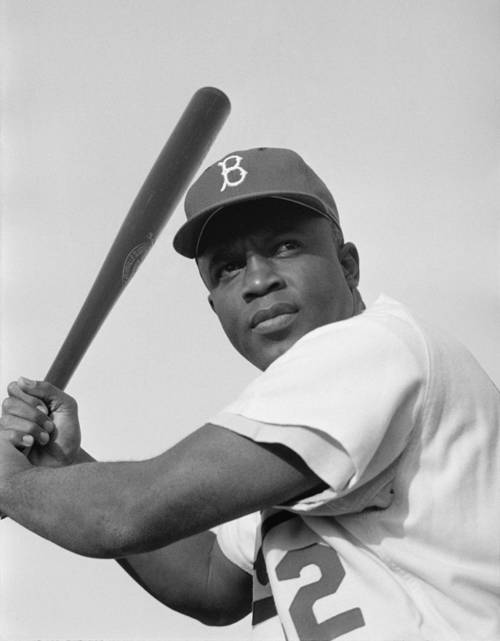
FAQ About Jackie Robinson

Who was Jackie Robinson?
Jackie Robinson was an American professional baseball player who became the first African American to play in Major League Baseball (MLB) in the modern era. Breaking the baseball color line when he started at first base for the Brooklyn Dodgers on April 15, 1947, Robinson was a significant figure in the civil rights movement and was instrumental in changing American sports and culture.

When did Jackie Robinson break the color barrier in baseball?
Jackie Robinson broke the color barrier in Major League Baseball on April 15, 1947, when he started at first base for the Brooklyn Dodgers. This momentous event marked the end of racial segregation in professional baseball, which had excluded players of color from the major leagues since the 1880s.

What team did Jackie Robinson play for?
Jackie Robinson played for the Brooklyn Dodgers in Major League Baseball. He joined the team in 1947 and played until his retirement in 1956. His time with the Dodgers included six National League pennants and a World Series championship in 1955.

Why is Jackie Robinson considered a significant figure in American history?
Jackie Robinson is considered a significant figure in American history because he not only changed the landscape of professional sports by breaking the color barrier in baseball, but he also symbolized the struggles and progress of the civil rights movement in America. His courage and dignity in the face of prejudice opened the doors for future generations of African American athletes and led to a broader conversation about racial equality.

What were some challenges Jackie Robinson faced as the first African American in MLB?
Jackie Robinson faced numerous challenges as the first African American to play in Major League Baseball. He dealt with racial slurs, threats, and on-field discrimination from both opponents and some teammates. Additionally, he faced segregation off the field, having to stay in separate hotels and eat in different restaurants from his white teammates during road trips.

What awards did Jackie Robinson win during his baseball career?
During his career, Jackie Robinson received numerous accolades, including the Rookie of the Year Award in 1947 and the National League Most Valuable Player Award in 1949, making him the first African American to win the MVP. He was also selected six times as an All-Star and was inducted into the Baseball Hall of Fame in 1962.

How did Jackie Robinson contribute to the civil rights movement?
Jackie Robinson contributed to the civil rights movement by using his prominence as a platform to speak out against racial discrimination. His breaking of the color barrier showcased the possibilities of integration in other areas of society. Beyond baseball, Robinson was involved in the NAACP and worked alongside leaders like Martin Luther King Jr., advocating for increased opportunities and equality for African Americans.

What number did Jackie Robinson wear, and why is it significant?
Jackie Robinson wore the number 42 throughout his career with the Brooklyn Dodgers. This number has become iconic, as MLB retired it league-wide in 1997 in recognition of Robinson's impact on the game and society. Each year on April 15th, known as Jackie Robinson Day, all MLB players, coaches, and managers wear number 42 to honor his legacy.

Where was Jackie Robinson born?
Jackie Robinson was born on January 31, 1919, in Cairo, Georgia. He was the youngest of five children in a family of sharecroppers. His family moved to Pasadena, California, when he was still a young child, which is where he grew up and first started to excel in sports.

What is Jackie Robinson Day?
Jackie Robinson Day is celebrated annually on April 15th by Major League Baseball to honor the legacy of Jackie Robinson and his debut as the first African American player in the modern era of MLB. On this day, all players, coaches, and managers wear the number 42 to commemorate Robinson’s pivotal role in breaking the color barrier.

How did Jackie Robinson's career impact other sports?
Jackie Robinson's successful integration into Major League Baseball paved the way for other sports to follow suit. His actions helped to break down racial barriers across the American sports industry, encouraging other professional leagues, such as the NFL and NBA, to integrate African American athletes much earlier than they might have otherwise. His legacy significantly impacted the opportunities available to future generations of athletes of color.

Did Jackie Robinson play any other sports besides baseball?
Yes, Jackie Robinson was a multi-sport athlete. While attending UCLA, he became the first student to win varsity letters in four sports: baseball, basketball, football, and track. His versatility and athleticism made him a standout in each of these sports, even before he focused solely on baseball professionally.

What were Jackie Robinson's early years like?
Jackie Robinson grew up in Pasadena, California, after his family moved from Georgia. In high school, he excelled in various sports, and his athletic prowess continued at Pasadena Junior College and UCLA, where he became the first athlete to letter in four sports. Despite his accomplishments, he often faced racial discrimination, but his experiences helped shape his resilience and determination.

How did Jackie Robinson's actions influence future civil rights activism?
Jackie Robinson's pioneering role in breaking the color barrier in baseball served as an early catalyst for the civil rights movement. His bravery and resilience in the face of racial discrimination demonstrated the potential for progress and inspired activists and ordinary citizens to push for greater equality. His example also influenced other athletes to use their platforms to advocate for social change.

What was Jackie Robinson's role after retiring from baseball?
After retiring from baseball, Jackie Robinson continued to be a strong advocate for civil rights. He held several positions, including serving on the board of the NAACP and working as a business executive. Robinson was also involved in political activism, supporting candidates and causes that aligned with his pursuit of social justice and equality.

What obstacles did Jackie Robinson overcome to succeed in baseball?
Jackie Robinson overcame numerous obstacles to succeed in baseball, including intense racial discrimination from fans, fellow players, and society at large. He faced abuse and hostility but maintained his professionalism and composure, gaining respect for his talent and character. His ability to withstand these challenges was crucial to his success and his enduring legacy.

How did Jackie Robinson's family influence his career?
Jackie Robinson's family played a vital role in supporting his career. His mother, Mallie Robinson, instilled in him the values of perseverance and determination. Robinson's wife, Rachel Robinson, was also a steadfast supporter, helping him endure the challenges of integration and playing a prominent role in his career, providing essential emotional support and unwavering encouragement.

What educational background did Jackie Robinson have?
Jackie Robinson attended John Muir High School, followed by Pasadena Junior College, where he excelled in sports. He then attended the University of California, Los Angeles (UCLA), becoming the first athlete there to earn varsity letters in four sports. Although Robinson left UCLA before graduating to help his family financially, his time there was marked by his outstanding athletic achievements.

How is Jackie Robinson honored today?
Jackie Robinson is honored in various ways today, including the annual Jackie Robinson Day in MLB, during which all players wear his number 42. His legacy is celebrated through the Jackie Robinson Foundation, which provides scholarships to minority students, and various institutions and events bearing his name. His story continues to inspire discussions on equality and civil rights, and his number 42 is permanently retired across all MLB teams.

What was significant about Jackie Robinson's rookie year?
Jackie Robinson's rookie year in 1947 was significant not only because he broke the color barrier in Major League Baseball, but also because of his exceptional performance. He won the inaugural Rookie of the Year Award, leading the National League in stolen bases and helping the Dodgers to win the pennant. His success on the field helped to challenge and eventually dismantle the racial prejudices existing in professional baseball and society.
